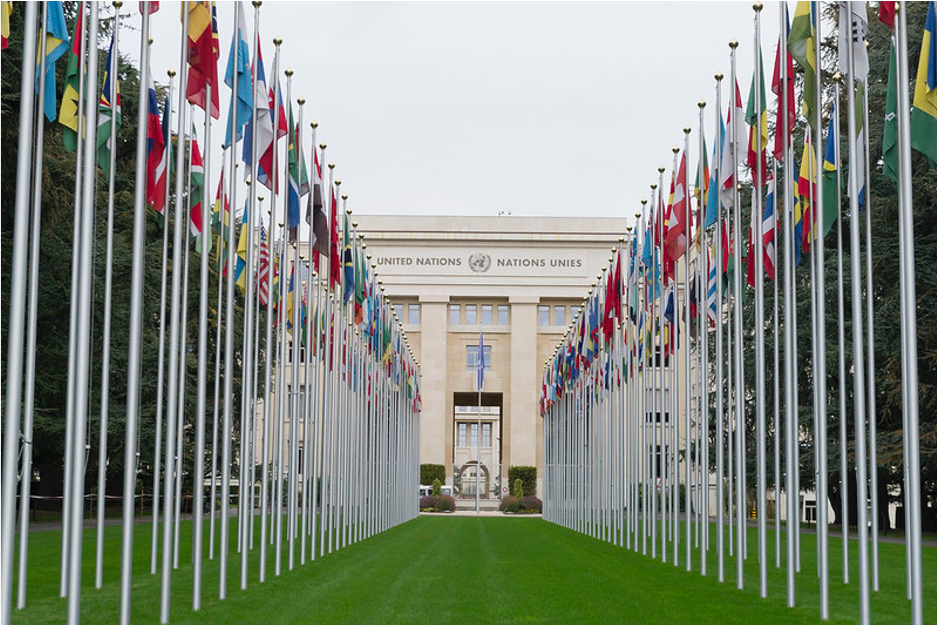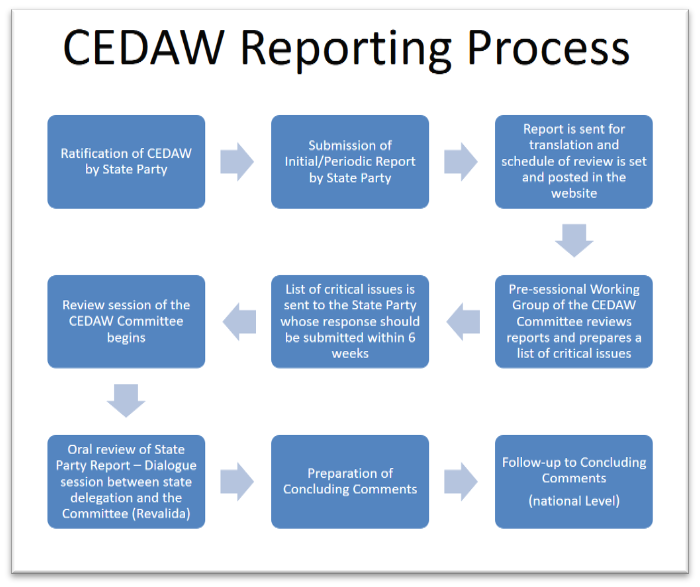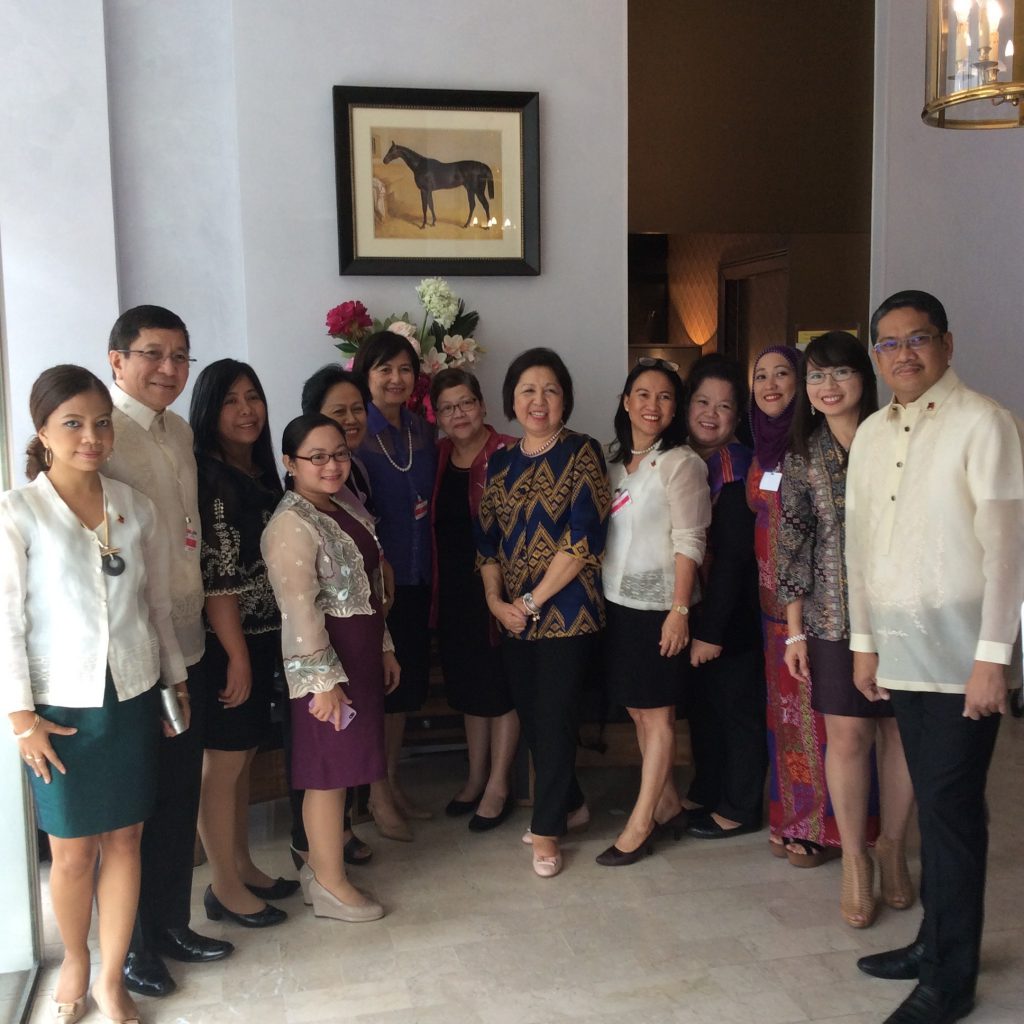Reporting to CEDAW
Under Article 18 of the CEDAW Convention, a State party is obligated to present a report to the CEDAW Committee one year after ratification and every four years thereafter on the legislative, administrative and other measures that must be taken to implement their obligations under this treaty. These reports, which may indicate factors and difficulties in implementation, are forwarded to the CEDAW Committee for its consideration.
The State party’s initial CEDAW report is intended to be a detailed and comprehensive description of the position of women in that country at the time of submission; it is meant to provide a benchmark against which subsequent progress can be measured. Second and subsequent national reports are intended to update the previous report, detailing significant developments that have occurred over the last four years, noting key trends, and identifying obstacles to the full achievement of the Convention.
Initial reports are considered by the Committee in the presence of a representative of the reporting country, who may make a supplementary presentation. Individual Committee members are free to ask for clarification or elaboration of any issue related to the report, the presentation, or to CEDAW’s goals. Typically, the country representative returns a day or so later to respond to those questions; answers or supporting material are often presented in writing.


Since 1990, second and subsequent reports have been reviewed by a pre-session working group of five Committee members. These periodic reviews or “revalida” are attended by the State party’s government delegation, most often including the heads of national women’s machineries and key officials of other relevant government agencies such as foreign affairs, justice, education, social welfare and health. The CEDAW Committee working group draws up questions to guide the full Committee’s examination of the report. These questions are submitted to the country’s representative in advance. The representative then meets with the Committee to respond to these questions and any others that members may wish to ask.
Following consideration of each State Party report, the CEDAW Committee formulates concluding comments which outline factors and difficulties affecting the implementation of the Convention for that State party, positive aspects, principal subjects of concern and suggestions and recommendations to enhance implementation of the Convention.
At its sixty-ninth session in March 2018, the CEDAW Committee decided to reinstate the simplified reporting procedure, which had been suspended in November 2016 after the procedure had initially been made available from 1 January 2015 on a pilot basis. The Committee decided to make the simplified reporting procedure available to all States parties, upon their request, provided that the State party concerned: (1) previously submitted an initial report which was considered under the regular procedure; and (2) has submitted an updated common core document, in accordance with the “Harmonized guidelines on reporting under the international human rights treaties, including guidelines on a common core document and treaty-specific documents”.
Under the simplified reporting procedure, the Committee’s pre-sessional working group prepares a list of issues to be approved by the Committee at its next regular session, to be transmitted to the State party concerned prior to the submission of its report. Such lists are known as lists of issues prior to reporting or LOIPR. The replies of the State party to the list of issues prior to reporting constitute its periodic report. The periodic report must not exceed 21,200 words.
The Committee is of the view that the simplified reporting procedure will assist States parties to prepare and submit more focused reports. The LOIPR, transmitted to States parties prior to the submission of their reports, will guide the preparation and content of their periodic report, facilitate the reporting process of States parties and strengthen their capacity to fulfill their reporting obligation in a timely and effective manner.
After the submission of the State party’s replies to the LOIPR, no further list of issues will be established by the Committee before the consideration of the State party’s report. For that reason, reports received under this procedure will be scheduled by the Committee for consideration as a matter of priority.
The preparation of the Philippines’ 9th CEDAW Periodic Report will follow this new procedure.
The Philippines’ CEDAW Reports
In compliance with Article 18 of the CEDAW Convention, the Philippines has submitted a total of eight State reports to the CEDAW Committee, to wit:
- Initial Report, 1982 (Concluding Observations, 1984)
- 2nd Periodic Report, 1988 (Concluding Observations, 1992)
- 3rd Periodic Report, 1993 (Concluding Observations, 1997)
- 4th Periodic Report, 1996 (Concluding Observations, 1997)
- Combined 5th and 6th Periodic Report, 2004 (Concluding Observations, 2006)
- Combined 7th and 8th Periodic Report submitted in 2015 (Concluding Observations, 2016)
Below are the links to the Philippines’ 5th-6th and 7th-8th CEDAW Periodic Reports, the corresponding lists of issues and Questions (LOIQs) and the Philippine response to these LOIQs.
The Philippines’ Combined 7th and 8th CEDAW Periodic Report
The Philippines’ Combined 7th and 8th CEDAW Periodic Report was submitted to the CEDAW Committee on January 2015.
CEDAW welcomes the accomplished progress since its consideration in 2006 of the State party’s combined fifth and sixth periodic reports in making legislative reforms, particularly in the adoption of the legislation on the Magna Carta of Women (Republic Act No. 9710) in 2009, the Responsible Parenthood and Reproductive Health Act (Republic Act No. 10354) in 2012 and the Expanded Anti-Trafficking in Persons Act of 2012 (Republic Act No. 10364) and Domestic Workers Act (Republic Act No. 10361) both in 2013.
CEDAW commends the State party’s efforts to improve its institutional and policy framework aimed at advancing the elimination of discrimination against women and promoting gender equality, which includes the adoption of the women’s empowerment, development and gender equality (Women’s EDGE) plan, covering the period 2013-2016, adoption of the national action plan on women and peace and security (NAPWPS), covering the period 2010-2016, aimed at the implementation of Security Council resolutions 1325 (2000) and 1820 (2008), establishment of the Philippine Commission on Women with a mandate to advance the women’s priority legislative agenda and monitor the implementation of the women’s empowerment, development and gender equality plan and designation of the Commission on Human Rights as the Gender Ombud. The State party has also ratified the Domestic Workers Convention, 2011 (No. 189), of the International Labour Organization (ILO).
A constructive dialogue held at the Office of the High Commission on Human Rights in Geneva, Switzerland on July 4-22, 2016 was attended by official Philippine Delegation Representatives from the Department of Foreign Affairs (DFA), Department of Health (DOH), Department of Social Welfare and Development (DSWD), Regional Commission on Bangsamoro Women (RCBW), Philippine Commission on Women (PCW), Department of Justice (DOJ), National Commission on Indigenous Peoples (NCIP), Commission on Higher Education (CHED), National Economic and Development Authority (NEDA), Department of Labor and Employment (DOLE), Philippine Overseas Employment Administration (POEA), and the Philippines’ Women’s Rights Representative to the ASEAN Commission on the Promotion and Protection of the Rights of Women and Children (ACWC).

List of Issues and Questions (LOIQs)
For the Philippines’ 7th and 8th CEDAW Periodic Reports, the report that was submitted by Franciscans International, Alyansa Tigil Mina (ATM) LILAK on October 2, 2015 includes the context of mining in the Philippines, specifically on violence against indigenous women; indigenous women right to livelihood, right to health, and right to food; and participation in political and public life of indigenous women. In November 2015, the Philippine Alliance of Women with Disabilities (PAWID) also submitted a proposed list of issues which includes discrimination/violence against women and girls with disabilities; employment and social protection; equal recognition before the law; women and girls with disabilities in the Philippines who lack of full and effective participation in organizations in all aspect of governance; and lack of disaggregated and comprehensive data collection and statistics on women and girls with disabilities. Links to these reports are as follows:
- Submission on List of Issues of the Philippine Alliance of Women with Disabilities
- Consideration of the Combined 7th and 8th Report: Submission for the List of Issues
Concluding Observations to the Philippines’ Combined 7th and 8th CEDAW Periodic Reports
The CEDAW Committee considered the combined seventh and eighth periodic reports of the Philippines at its 1405th and 1406th meetings, on 5 July 2016. The Committee has issued its list of issues and questions on the Philippines’ report. The Philippines has likewise provided its responses. See links of the documents below:
- Concluding Comments on Philippines’ 7th and 8th CEDAW Periodic Report
- List of issues and responses of the Philippines to the concluding comments.
The Philippine’s Combined 5th and 6th CEDAW Periodic Report
The Philippines Combined 5th and 6th CEDAW Periodic Report was submitted to the CEDAW Committee in June 2004.
The State party reported that it has ratified the Optional Protocol to the Convention in November 2003. The CEDAW Committee also commends the adoption of laws which contribute to the enhanced implementation of the Convention. They include the Anti-Trafficking in Persons Act of 2003, the Anti-Violence against Women and Their Children Act of 2004, the Family Courts Act of 1997, the Rape Victims Assistance Act of 1998, the Indigenous People’s Rights Act of 1997 and the Social Reform and Poverty Alleviation Act of 1997. 6. The Committee welcomes the Philippine Plan for Gender-Responsive Development 1995-2025, which intends to translate the Convention and the Beijing Platform for Action into policies, strategies, programs and projects for Filipino women. CEDAW also commends the State party for providing pre-departure information and support services to overseas Filipino workers who migrate on a legal basis.
List of Issues and Questions (LOIQs)
The Committee on the Elimination of Discrimination against Women pre-session working group on thirty-sixth session submitted the Philippine responses to the list of issues and questions with regard to the consideration of the combined fifth and sixth periodic reports on 17 May 2006. The report includes questions and issues on Constitutional, legislation and status of the Convention, Violence against women, Trafficking and exploitation of prostitution, Stereotypes and education, employment, Vulnerable groups of women, Participation of Indigenous Women in Community Level Consultative Bodies, Participation of Women in Agricultural and Fisheries Councils, Participation of Women Agrarian Reform Communities, right to health, Optional protocol. (Please refer here for more details)
Concluding Observations to the Philippines’ Combined 5th and 6th CEDAW Periodic Reports
The Committee considered the combined fifth and sixth periodic report of the Philippines at its 747th and 748th meetings, on 15 August 2006). The Committee’s list of issues and questions and the responses of the Philippines are contained in the document in the following link:
Shadow Report from NGOs/CSOs
The CEDAW Convention is an influential medium for promoting women’s human rights. These procedural and format guidelines are designed to assist NGOs in producing shadow reports for the CEDAW Committee to use in evaluating government reports under the CEDAW Convention. Shadow reports also serve as sources of issues and questions on the implementation of the State party.
Below are the links to the Philippine NGO shadow reports to the CEDAW Committee:
Philippines’ 7th and 8th CEDAW Shadow Reports
Philippines’ 5th and 6th CEDAW Shadow Reports
Ninth Periodic Report submitted by the Philippines under Article 18 of the Convention

